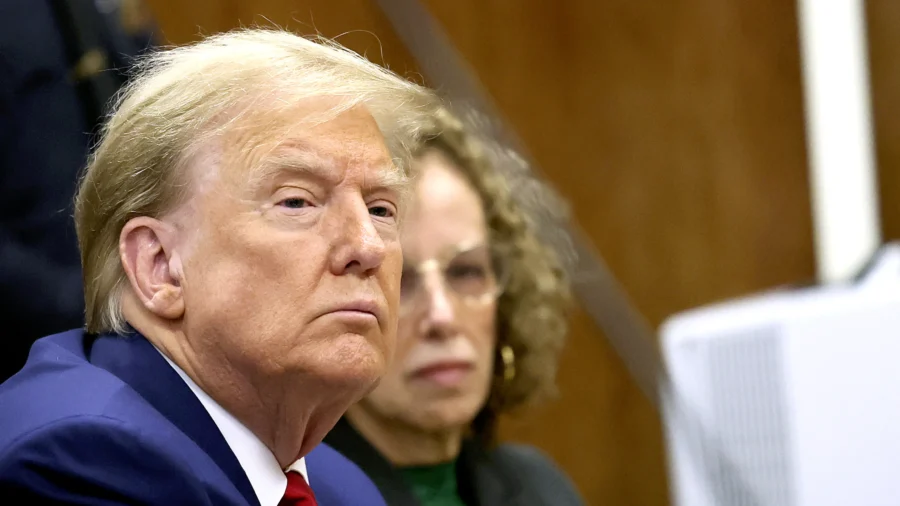Attorneys for former President Donald Trump filed an appeal on April 8 and requested interim relief, or a stay, just one week before his first criminal case was set to go to trial in New York.
On the same day, a judge with the appellate division of the New York Supreme Court rejected the request to delay trial. Defense attorneys had argued during an emergency hearing that the trial should be postponed while they seek a change of venue.
Manhattan District Attorney Alvin Bragg is prosecuting President Trump on 34 counts of falsifying business records related to an alleged “hush money” payment scheme to influence the 2016 elections. New York Supreme Court Justice Juan Merchan, presiding over the case, has criticized the defense more than once for what he described as attempts to delay the trial.
The defense has indeed filed a flurry of motions and pre-motion letters in the last days leading up to the trial, protesting a gag order and its expansion, citing changed circumstances that warrant the judge’s removal, and arguing a presidential immunity defense that will soon be reviewed by the U.S. Supreme Court.
Defense lawyers have also argued that the case should not proceed under the heightened media coverage that the first-ever criminal trial of a former U.S. president is currently attracting and submitted survey results showing high awareness of the trial among New York County residents, arguing that the defense cannot seat an impartial jury in New York.
President Trump said himself during a press conference that the case should not go to trial at the height of the presidential election season, signaling an appeal to higher courts.
Several of these motions had already been rejected by Justice Merchan. On April 3, he rejected a motion to postpone the trial until the Supreme Court has reviewed the presidential immunity defense and to hold an evidentiary hearing about the high court’s decision. On April 1, the judge upheld and expanded the gag order that he issued to cover his and the district attorney’s family members. On April 5, the prosecutors objected to the defense’s second request for a recusal, and the judge is set to imminently issue a decision.
Also on April 8, the court issued media access instructions for an April 15 trial and the jury questionnaire hours after the appeal was filed.
The district attorney’s office has opposed the appeal.
Rescheduling
The judge was already critical of the defense when President Trump’s attorneys made some of these requests verbally during a February scheduling conference.
President Trump is facing four criminal indictments in separate jurisdictions, and for a time, the district attorney indicated that this case may be the last to go to trial as federal judges began scheduling trials in 2024 that would have overlapped with the Manhattan March 25 trial date.
However, one of those cases is now before the Supreme Court on appeal of one pre-trial motion to dismiss, and another may yet be delayed as a federal judge found that discovery was more “voluminous” than expected. In February, Justice Merchan confirmed the March 25 trial date. Weeks later, federal attorneys produced an unexpected, last-minute discovery of more than 100,000 pages regarding a key witness to President Trump’s team.
The defense requested 90 days to review the new material while the prosecutors offered 30; on March 25, the judge rescheduled the trial to begin with jury selection on April 15.
The next day, Justice Merchan issued a gag order on President Trump, finding that the risk that his speech would threaten fair trial proceedings was “paramount.”
Gag orders cannot prohibit defendants from speaking about the court itself, however, and a federal appeals court had ruled in another gag order on President Trump that they should not extend to the lead prosecutor either.
Shortly after the order, President Trump accused the judge of political bias and mentioned the judge’s daughter on social media.
In a request for recusal last year, defense attorneys argued that the judge’s daughter had a significant role at a political marketing firm that counted among its clients politicians who had run on anti-Trump messaging.
The judge rejected the motion on the basis that the defense presented hypothetical situations, but in a renewed motion to recuse last week, the defense argued that the situation was no longer hypothetical. They pointed to filings that showed that groups and individuals that had paid the judge’s daughter’s firm millions of dollars have been running fundraising campaigns that highlight the Trump case over which the judge is presiding. They argued that the judge now has a commercial interest in the case and must step down.
Prosecutors argued that it was still speculation that the judge was affected by these contracts or his daughter’s firm’s revenue and that there was no basis for the judge’s recusal.
The Associated Press contributed to this report.
From The Epoch Times


